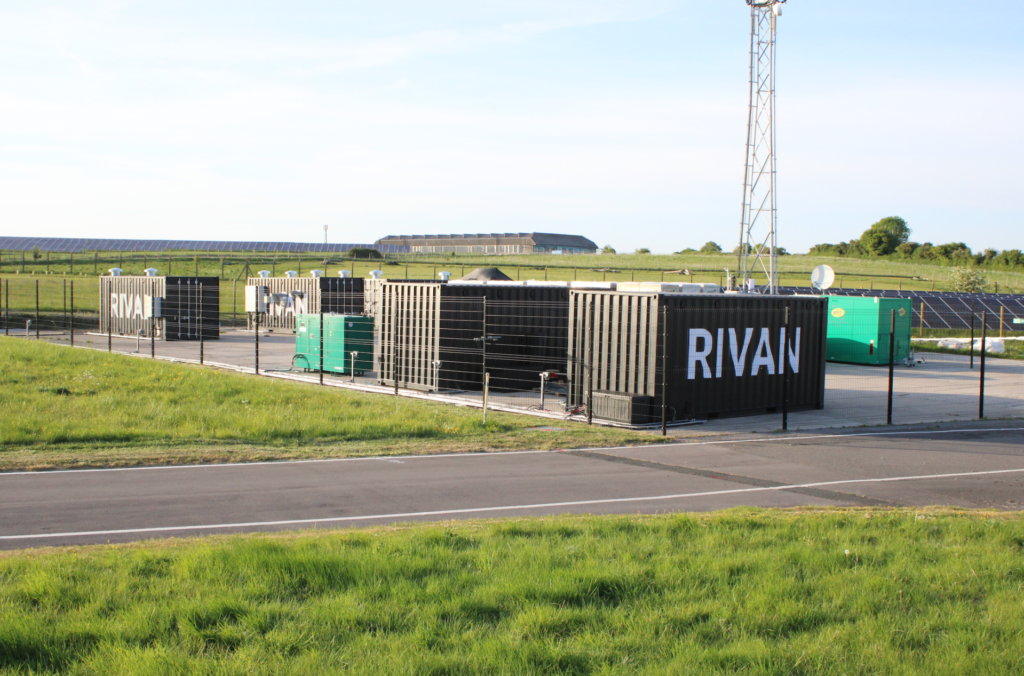
- Rivan designs and manufactures modular synthetic fuel plants that are vertically integrated with off-grid solar power.
- These plants use carbon captured from the air and hydrogen produced by splitting water to create chemically identical, decarbonised fuels.
- The exponentially falling cost of solar power will allow Rivan to produce synthetic fuels cost-competitively with fossil fuels.
- Rivan has deployed a 100kW pilot plant at a decommissioned military base in the UK.
- Starting with synthetic natural gas, Rivan will expand into liquid hydrocarbons such as aviation fuel.
Rivan, the company enabling energy security through synthetic fuels, has raised £10 million in funding led by Plural, with participation from 20VC, NFDG (Nat Friedman and Daniel Gross), and prominent angel investors Patrick and John Collison (Stripe). The capital will be used for R&D on Rivan’s electrolyser, direct-air-capture (DAC) and Sabatier reactor modules, as well as scaling its pilot plant up to 1MW.
Starting with synthetic natural gas (SNG), Rivan is addressing the 22 per cent of global emissions that stem from heavy industry’s reliance on natural gas for steel, cement and chemical production. These sectors cannot be easily electrified and have few cost-effective decarbonisation options. Rivan’s modular plants, powered by off-grid solar and injecting SNG into pipelines across the UK and Europe, aim to provide that solution. Its three key modules — electrolyser, DAC and Sabatier reactor — are designed and manufactured by Rivan in the UK, accelerating cost-reduction and deployment speed.
The case for synthetic fuels
Rivan was founded by Harvey Hodd, a serial entrepreneur with two successful tech exits, who is now focused on building the technology and infrastructure to aid the UK’s and Europe’s energy security. Over the past year, Harvey has assembled a multidisciplinary team of engineers, infrastructure specialists and solar planners to bring this vision to life.
Synthetic fuels are chemically identical, but carbon-neutral, substitutes for fossil fuels; they can flow through today’s power and pipeline networks with no modifications. Historically, high input-energy costs made synthetic fuels uncompetitive. However, over the past decade, solar power has experienced dramatic cost reductions, now reducing at a rate of about 1% a month based on massive production capacity and demand. This is opening a pathway for synthetic fuels to match fossil fuel costs within the next five to ten years.
Rivan designs and manufactures its systems at a 10,000 sq ft factory in Bermondsey, South London, and has deployed its first 100kW pilot at a decommissioned UK military base. This system demonstrates cost-effective, grid-specification SNG production with only air and water as inputs. Rivan is now aiming to scale the site to 1MW, while improving performance, enhancing integration and reducing manufacturing costs, ahead of larger commercial deployments in 2026.
Harvey Hodd, founder and CEO of Rivan, said: “Capturing the 12 gigatonnes of carbon emitted every year by heavy industry is one of the defining challenges of our time. For hard-to-abate industries like steel, cement, aviation and chemicals, neither carbon credits nor batteries paired with renewables provide a realistic solution. Until we develop cost-effective synthetic fuels from carbon captured from the air, we can’t expect industry to decarbonise. My hope is that our technology, combined with the unbelievably talented and driven team I get to work with everyday, can forge that future a reality. This is particularly important in the UK and Europe — where low domestic production and limited storage have hurt industry, and where we hope to lead by example to show that synthetic fuels can be competitive with fossil fuels to deliver long-term energy security.”
Taavet Hinrikus, Partner at Plural, said: “Harvey embodies the entrepreneur we back at Plural: scar tissue from scaling previous businesses and the drive to positively impact GDP and the world. Rivan is manufacturing vertically-integrated machines in Bermondsey and deploying them to solar-powered, off-grid sites to make carbon capture economically viable and achieve optimum costs and performance. With this ambition and Harvey’s background, I’m excited to be a part of Rivan’s mission to transform energy security and tackle the climate crisis once and for all.”
About Rivan
Rivan designs and manufactures modular synthetic fuel plants to decarbonise heavy industry. Rivan aims to capture gigatonnes of carbon making synthetic fuels from the air cheaper than fossil fuels from the ground. https://rivan.com/
They are currently hiring across a range of engineering positions.
About Plural
Plural is an early-stage investment fund that backs the most ambitious founders on a mission to change the world through technology. Plural launched in June 2022 with the aim to give serious founders in Europe investors with experience to match their ambition. Based in Tallinn, Estonia, and London, UK, Plural’s mission is to have GDP-level impact on Europe, address systemic risks and reduce the opportunity gap worldwide through the companies it backs. https://pluralplatform.com
Source
Rivan, press release, 2025-05-21.
Supplier
Share
Renewable Carbon News – Daily Newsletter
Subscribe to our daily email newsletter – the world's leading newsletter on renewable materials and chemicals









